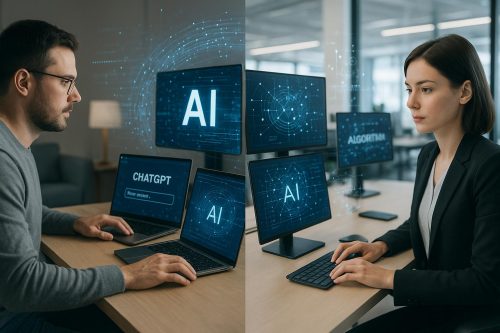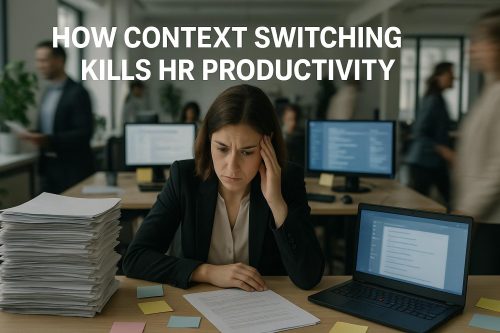Legal jobs are changing fast, thanks to AI and new technologies. By 2030, future legal jobs and professionals will need to combine traditional legal skills with technical expertise to stay relevant. Here’s what you need to know:
- AI is reshaping the legal field: 77% of legal professionals expect AI to significantly impact their work in the next five years. AI tools already save U.S. lawyers 266 million hours annually by automating tasks like research and document drafting.
- New roles are emerging: Jobs like AI compliance specialists, contract automation managers, and digital ethics officers are becoming essential.
- Tech skills are critical: Legal professionals must understand AI tools, data analysis, and ethical frameworks to manage AI systems effectively.
- Ethics and oversight matter: Lawyers will play a key role in ensuring AI systems are fair, transparent, and free from bias.
The bottom line? The legal industry is evolving quickly, and those who adapt today will lead the way tomorrow.
AI and the Future of Legal Jobs: What Law Firms Must Do to Stay Competitive [Episode 16]
How AI is Creating New Future Legal Jobs
Artificial intelligence is reshaping the legal profession, giving rise to specialized positions that blend legal expertise with technical know-how. The rapid growth of the legal AI market – from $1.75 billion in 2025 to a projected $3.90 billion by 2030 – underscores the profound changes underway. This shift is creating opportunities for professionals to oversee automated systems and strategically implement AI tools.
Legal departments are responding to this transformation by significantly increasing their technology budgets. Gartner predicts that legal tech spending will account for 12% of in-house budgets by 2025, tripling the percentage from 2020. Meanwhile, Goldman Sachs estimates that 44% of legal work could eventually be automated by AI. This creates a demand for professionals who can connect the dots between technology and legal practice, paving the way for emerging roles like those detailed below.
AI in Compliance: Managing Regulatory Requirements
AI is revolutionizing compliance by streamlining how organizations handle regulatory requirements. This has opened up career paths for legal professionals skilled in both regulatory frameworks and technology. AI systems can process massive volumes of regulatory data in minutes, drastically reducing the time spent on manual tasks.
In March 2023, Hawk, an AI technology firm, showcased how its tools enhance compliance efficiency by automating routine tasks like document analysis. Robin Lee, General Manager for APAC at Hawk, highlighted this shift:
"The operational [side] of compliance [entails] a lot of busy work like checking documents. This is where AI will come in and help."
AI tools not only save time but also deliver precise regulatory information, minimizing errors common in manual processes. As a result, there’s growing demand for AI compliance specialists who can design, implement, and supervise these systems.
Organizations are also exploring ways to ensure their AI programs meet regulatory standards while maintaining fairness and accuracy. Professionals in this space are tasked with creating policies for AI ethics, defining acceptable usage, and setting up oversight systems to identify and address unexpected patterns in automated processes.
Contract Automation Roles
Contract automation is emerging as one of the fastest-growing areas in legal technology. These roles focus on leveraging AI to simplify contract drafting, negotiation, and management. The need for such specialists is evident, as 70% of legal departments report higher workloads while 66% face stagnant or shrinking budgets.
Contract automation professionals use AI to quickly review contracts, analyze large datasets, and predict outcomes. Their responsibilities extend beyond operating these systems – they also design workflows, train AI on specific contract types, and ensure compliance with legal standards. This is especially important as 43% of new legal matters in Australian law firms are billed on a fixed-fee basis, and 76% of legal teams prioritize controlling outside counsel costs.
Jerry Levine, Chief Evangelist & Co-General Counsel at ContractPodAi, explained the competitive edge these tools provide:
"Legal departments embracing AI tools today – and understanding the way they work – will create a significant competitive edge for those teams by 2030. Leading teams are already building practical technical and AI competency via real-world applications, while simultaneously developing governance frameworks that will scale with increasingly sophisticated technology. Those who wait for ‘perfect’ AI solutions will find themselves years behind their competitors."
These roles require a mix of legal knowledge and technical expertise. Professionals need to understand contract law, negotiation tactics, and risk assessment while also mastering AI capabilities, data management, and system integration.
Digital Ethics Officer: Managing Automation and Accountability
As AI becomes more integral to legal workflows, ethical oversight is essential. Digital ethics officers play a critical role in ensuring AI systems operate transparently and fairly, particularly as these tools influence decision-making across the profession.
"As legal AI-driven solutions increasingly influence decision-making and workflows across the legal profession, understanding the ethical implications and potential data limitations has become vital."
These professionals are responsible for crafting ethical guidelines for AI use, establishing oversight mechanisms, and creating processes to address unexpected issues. They collaborate with technical teams to ensure AI tools adhere to ethical standards and function as intended. Law firms and corporate legal departments are increasingly hiring ethics officers to meet client demands for responsible AI practices.
In some cases, digital ethics officers also work on training AI systems to avoid factors that have historically led to biased outcomes. With over two-thirds of organizations planning to expand their Generative AI investments in 2025, legal teams are receiving significant executive support to prioritize these roles. This highlights the growing importance of ethical oversight as AI adoption continues to expand within the legal field.
New Legal Tech Jobs in 2030
The legal field is undergoing a technological transformation that’s opening up new career opportunities. By 2030, legal departments will need professionals who can merge traditional legal expertise with advanced technology. These new roles represent an exciting intersection of law and tech, creating opportunities for those ready to embrace this shift. Building on advancements in compliance and contract automation, these positions highlight how deeply technology is becoming integrated into legal work.
85% of legal professionals believe that incorporating AI into their practices will require new roles and skills. Additionally, 44% of general counsel report their teams are already using generative AI.
AI-Powered Legal Research Analysts
One of the most promising roles emerging in the legal world is that of AI-powered legal research analysts. These professionals combine traditional legal research skills with a deep understanding of AI tools, revolutionizing the way legal teams gather and process information.
Their work involves training AI systems to navigate legal databases, ensuring compliance with data protection laws, and turning complex AI outputs into actionable insights. By doing so, they help lawyers work more efficiently and effectively. For example, AI can reduce the time needed for legal tasks by 14–37%, boosting productivity on complex assignments by up to 140%.
In 2025, Harvey AI – a tool that reviews documents, redlines contracts, and drafts memos – reached a valuation of $5 billion and partnered with major law firms like A&O Shearman and PwC Legal. Tools like this are setting the stage for AI to become the starting point for legal case research, with natural language queries replacing traditional Boolean searches and predictive suggestions saving even more time.
Legal Data Scientists
As legal departments turn to data-driven decision-making, legal data scientists are becoming indispensable. These professionals bridge the gap between legal teams and business operations, helping streamline processes, improve accuracy, and access valuable organizational data. Currently, 14% of legal departments have hired nonlawyer data scientists or analytics specialists.
Their responsibilities go beyond data analysis. They train legal teams to adopt technology in their daily workflows and ensure the quality and governance of legal data. By analyzing this data, they identify risks, develop analytic platforms, and drive internal process improvements.
"Data science has the power to bring objectivity to law. It also allows us to take many sources of information and put them together to understand the facts. That’s why it’s a valuable tool for both lawyers and data scientists."
– Karolina Naranjo-Velasco, Doctoral Student at UVA
Legal data scientists contribute to predictive analytics, case management, and data visualization. They can forecast litigation outcomes, spot patterns human reviewers might miss, and help legal teams manage time more effectively while keeping clients informed. By 2025, data will play a role in every decision, interaction, and process, and legal data scientists will be central to making this a reality.
Contract Automation Specialists
Contract automation is rapidly becoming a cornerstone of legal technology. Contract automation specialists use natural language processing (NLP) to streamline contract drafting and management processes. Unlike earlier roles focused on basic automation, these specialists design and integrate contract lifecycle management (CLM) systems into broader enterprise platforms, driving efficiency across organizations.
By 2030, CLM systems will be standard in legal departments. Specialists in this field will oversee the design, implementation, and maintenance of these systems. They ensure AI tools are trained on reliable data, monitor for bias, and fine-tune system performance.
This role is critical, especially as 70% of legal departments report increasing workloads, while 66% face flat or shrinking budgets. Contract automation specialists address this challenge by standardizing processes, updating templates, controlling deviations, and automating escalation points.
These systems are evolving rapidly. Routine contracting will become fully automated, with AI predicting the need for new agreements and drafting terms. Integrated with enterprise technology, CLM systems will help reduce costs, manage risks, and improve performance.
"Legal departments embracing AI tools today – and understanding the way they work – will create a significant competitive edge for those teams by 2030."
– Jerry Levine, Chief Evangelist & Co-General Counsel, ContractPodAi
To succeed in this role, specialists need a mix of legal and technical skills. They must understand contract law, risk management, and negotiation while mastering AI, data management, and system integration. These professionals also play a key role in establishing governance frameworks for responsible AI use and managing associated risks.
As legal teams shift from defending the business to driving business outcomes, contract automation specialists are at the forefront, helping legal departments deliver measurable results.
sbb-itb-eb32bf3
Required Skills for Legal Professionals in 2030
The legal field is undergoing a transformation that calls for professionals to develop new skills. With roles like AI compliance specialists and digital ethics officers gaining prominence, legal practitioners must now blend their traditional expertise with technological know-how. This shift is driven by the need to manage heavier workloads within tighter budgets, making tech-savviness not just an asset but a necessity.
Legal departments are increasingly being asked to do more with fewer resources. The legal AI market, for instance, is projected to grow from about $1.75 billion in 2025 to roughly $3.90 billion by 2030, reflecting an annual growth rate of 17.3%. Those who adapt to these evolving demands will stand at the forefront of a rapidly changing industry, where technical skills and ethical oversight go hand in hand.
Technical Skills in Legal Tech Tools
Understanding how to work with advanced legal tech tools is no longer optional – it’s essential. AI literacy, for example, is becoming as critical as knowing case law. Legal professionals need a grasp of generative AI concepts like machine learning, natural language processing, and neural networks to effectively use these tools and identify their limitations. Practical experience with AI tools is equally important for selecting and deploying them appropriately.
New roles are emerging to meet these demands, such as Legal Technology Strategists, Legal Data Scientists, and Legal Engineers, which combine legal expertise with technical skills. Even those in more traditional roles are now expected to handle tasks like overseeing AI-powered contract analysis or working with predictive tools.
Risk evaluation is another key area. Professionals must assess potential pitfalls, including data security issues, liability for AI errors, and intellectual property challenges when implementing tech solutions.
"Legal departments embracing AI tools today – and understanding the way they work – will create a significant competitive edge for those teams by 2030. Leading teams are already building practical technical and AI competency via real-world applications, while simultaneously developing governance frameworks that will scale with increasingly sophisticated technology. Those who wait for ‘perfect’ AI solutions will find themselves years behind their competitors." – Jerry Levine, Chief Evangelist & Co-General Counsel, ContractPodAi
Ethical Judgment and Human-Centered Skills
Technical skills alone aren’t enough. Legal professionals also need to refine their ethical judgment and human-centric abilities to ensure that AI-driven practices uphold integrity. Human oversight is vital in critical decision-making processes. Lawyers must develop ethical frameworks to align AI systems with societal values, ensuring outputs are free from bias and discrimination.
The risks of neglecting ethical oversight are clear. In February 2025, the case of Wadsworth v. Walmart Inc. led to a lawyer losing their license and being fined $5,000 for citing fake cases generated by AI. Similarly, in January 2025, Kohls v. Ellison et al. saw a court reject an expert declaration prepared by a Stanford expert due to fabricated AI-generated sources, damaging the expert’s credibility.
These incidents highlight why ethical reasoning cannot be left to machines. As Fabian Luetz, former European Commission Legal Officer, puts it:
"AI can certainly provide us with legal information, but it lacks the personal element"
Applying ethics to legal tech means going beyond generic guidelines to create specific frameworks tailored to the legal field. Lawyers must identify key values like fairness, transparency, and client-focused service, translating them into actionable principles for tech use.
As automation becomes more prevalent, human-centric skills grow in importance. Legal professionals must adapt to new challenges, consider multiple perspectives, and refine AI systems to meet human needs. They also need to communicate AI limitations and biases effectively to clients and courts, while establishing processes for human review of AI-generated results.
The demand for AI specialists is rising, with 39% of respondents predicting growth in this area. These roles require a mix of technical expertise and ethical judgment, as the goal is to enhance human decision-making rather than replace it.
Lastly, managing client relationships remains a deeply human task. Lawyers must clearly define roles within tech-augmented workflows to ensure efficiency doesn’t come at the cost of personal attention or ethical oversight. Balancing technology with ethical considerations is essential for legal professionals aiming to succeed in the evolving legal landscape of 2030.
Challenges and Opportunities in Future Legal Work
The evolution of legal work comes with its fair share of obstacles and opportunities. A recent survey revealed that 77% of legal professionals expect AI to significantly influence their work within the next five years. Yet, 90% of corporate legal departments report only slow to moderate progress in adopting AI tools. This gap between optimism and actual implementation highlights the complexities facing the legal field. Below, we delve into some of the key challenges and possibilities shaping the future of legal work.
Data Privacy Concerns with AI Platforms
As AI continues to transform legal practices, protecting sensitive data has become a top priority. Data security is particularly critical as AI takes on roles in compliance and other sensitive areas. For instance, 37% of professionals hesitant to adopt AI cite concerns about safeguarding legal data. Recent high-profile breaches underscore these risks. The 2023 T-Mobile API breach exposed the personal data of 37 million customers – names, phone numbers, and PINs – after attackers exploited AI vulnerabilities. Similarly, Yum! Brands faced an AI-enabled ransomware attack that disrupted 300 UK branches for weeks, targeting both corporate and employee data.
These incidents highlight why 92% of organizations believe new approaches to risk management are essential when using AI. Legal professionals working in areas like contract automation and digital ethics must navigate privacy regulations such as GDPR, CCPA, and HIPAA while integrating AI tools. Public trust is also at stake: 60% of consumers express concerns about how AI handles private information, and 65% report losing trust in organizations due to questionable AI practices. Rebuilding trust requires transparent, robust data protection measures.
The American Bar Association‘s Formal Opinion 512 offers clear advice:
"All lawyers should read and understand the Terms of Use, privacy policy, and related contractual terms and policies of any GAI tool they use to learn who has access to the information that the lawyer inputs into the tool or consult with a colleague or external expert who has read and analyzed those terms and policies."
Practical steps for data security are becoming essential in legal roles. Troy Doucet, Founder of AI.Law, advises:
"You have control over what you input into AI, so do not input data that you do not feel comfortable inputting."
To protect client information, legal professionals are encouraged to adopt data minimization practices, use anonymization techniques, and ensure secure API protocols. Regular audits and compliance checks can help identify and mitigate risks before they escalate.
Reskilling and Upskilling Current Roles
While addressing data security, legal organizations must also focus on reskilling their workforce to effectively use new technologies. The changing legal landscape demands a blend of technical and human skills. According to recent findings, 85% of professionals believe that incorporating AI into legal work will require new roles and skill sets. However, many organizations lack structured programs to support this transition.
The need for training is clear. For example, 98% of law firm business service professionals want access to upskilling or reskilling opportunities, yet only 21% currently receive mentorship or coaching. Additionally, 48% of workers say they would switch jobs for better training, and 62% want more control over their skill development. Providing comprehensive training programs can give legal organizations a competitive edge.
This shift isn’t just about technology – it’s about redefining roles. Bernice Melvin, Legal Process Associate at Legal Support World, explains:
"Instead of replacing lawyers and support staff, AI presents an opportunity to augment their capabilities, streamline workflow processes, and enable them to engage in higher-level tasks requiring critical thinking, creativity and emotional intelligence."
To succeed, reskilling efforts should focus on both technical tools and soft skills. Organizations can identify the specific competencies needed for AI-driven roles and design targeted learning pathways. This might include training on legal tech platforms, data analysis, and AI oversight, alongside communication and critical thinking development.
Hands-on learning opportunities are particularly effective. Programs like internal apprenticeships, peer mentorship, and cross-departmental initiatives allow legal professionals to gain practical experience with emerging technologies while building confidence in their evolving roles.
Beyond individual training, fostering a culture of continuous learning and adaptability is essential. Interestingly, AI itself can aid in this process – by analyzing employee career histories and performance data, AI tools can offer personalized training recommendations that align with both individual goals and organizational needs.
The legal profession is at a pivotal moment where technological innovation meets human expertise. Those who embrace the challenges and opportunities of this transformation will help shape a future of more efficient, ethical, and impactful legal services – all while carving out fulfilling careers in this rapidly evolving field.
Conclusion: Preparing for Future Legal Jobs
The legal field is on the brink of major transformation. The legal AI market is forecasted to grow from about $1.75 billion in 2025 to approximately $3.90 billion by 2030, with a compound annual growth rate of 17.3%. In fact, 77% of legal professionals anticipate that AI will significantly influence their work within the next five years, and 85% believe this shift will demand new roles and specialized skills.
Hybrid roles are becoming the future of legal work. By 2030, nearly 40% of workers’ core skills are expected to evolve, making continuous learning a necessity. This evolution calls for legal professionals to become hybrids – combining legal expertise with technical skills in areas like AI literacy, data science, ethical decision-making, and legal engineering.
Jerry Levine, Chief Evangelist & Co-General Counsel at ContractPodAi, underscores the urgency of this shift:
"Legal departments embracing AI tools today – and understanding the way they work – will create a significant competitive edge for those teams by 2030. Leading teams are already building practical technical and AI competency via real-world applications, while simultaneously developing governance frameworks that will scale with increasingly sophisticated technology. Those who wait for ‘perfect’ AI solutions will find themselves years behind their competitors."
This insight highlights the critical need to act now, a theme explored throughout the discussion on emerging legal tech roles.
Blending technical expertise with human-centered skills is key. Legal professionals must not only master AI and analytical thinking but also enhance their creativity, emotional intelligence, ethical reasoning, and strategic decision-making. These "durable skills" are in high demand – 4.7 times more than technical skills – with over 80% of legal job postings now requiring at least one of these capabilities.
To prepare, legal professionals can take practical steps such as identifying areas where AI can have the most impact, developing strong data strategies, and setting up governance frameworks for ethical AI use. Pursuing certifications in AI ethics or legal engineering, specializing in fields like AI patent prosecution, and collaborating with top legal tech providers are also valuable strategies.
As the legal profession adapts to an AI-enhanced future, those who embrace these changes today will lead the way in shaping a more efficient, ethical, and impactful legal landscape. The time to prepare is now.
FAQs
What new career opportunities are emerging in the legal field due to advancements in AI and technology?
Advances in AI and technology are transforming the legal field, opening up a range of new career paths that combine tech expertise with legal knowledge. Future legal roles are increasingly centered around integrating technology into traditional legal practices. Some of these emerging positions include:
- Legal Technologists: Experts in implementing and managing tech tools to optimize legal workflows and processes.
- AI Compliance Officers: Professionals tasked with ensuring that AI systems adhere to legal and regulatory requirements.
- Contract Automation Specialists: Specialists focused on developing and maintaining automated systems for drafting and managing contracts.
- Digital Ethics Officers: Individuals who address ethical challenges related to AI and data use within legal frameworks.
These roles underscore the growing need for professionals who can navigate both legal and technological landscapes, improving efficiency and ensuring compliance in an evolving industry.
How can legal professionals balance technical expertise and ethical responsibility when using AI in legal practices?
Legal professionals can navigate the intersection of technical know-how and ethical responsibility by prioritizing education, oversight, and a steadfast commitment to ethical standards. With AI playing an increasingly central role in legal work, it’s vital to grasp not only its strengths but also its risks – such as bias, privacy issues, and questions of accountability. Staying up-to-date through continuous training and carefully evaluating AI-generated outputs are key steps to preserving accountability and maintaining clients’ trust.
Incorporating ethical training into legal education is equally important. When legal professionals combine a solid ethical foundation with technical expertise, they’re better equipped to use AI responsibly. By promoting a culture that values both ethical awareness and technical skill, the legal field can confidently adopt AI while addressing potential ethical pitfalls.
What skills should legal professionals focus on to thrive in the future job market by 2030?
To thrive in the legal field by 2030, professionals will need a blend of technical know-how and strong interpersonal abilities. Gaining proficiency in legal tech tools – like AI-powered contract automation and compliance platforms – will be crucial as technology continues to transform legal workflows. A solid grasp of digital ethics and new regulations will also be key to navigating the increasingly complex legal environment.
Equally important will be honing skills such as analytical thinking, flexibility, and teamwork, as legal roles increasingly overlap with other fields. Staying ahead of tech developments and building these versatile capabilities will help legal professionals stay competitive in an industry that’s evolving at breakneck speed.





